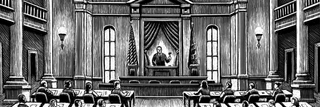
Campaign Cash and Judicial Outcomes
A new book offers empirical evidence that reelection pressures influence judicial decision-making.
Wealthy people and corporations can pump lots of money into elections and campaigns to elect and reelect lawmakers who promote their agendas. In a system like ours in which most state judges are elected, the wealthy also can spend money to elect and reelect judges who decide cases the way they want.
This should disturb anyone who believes that money shouldn’t dictate outcomes in a fair and impartial judicial system. This is especially the case in a world where the U.S. Supreme Court is leaving more and more important issues to the states, from reproductive rights to partisan gerrymandering. My new book with Joanna Shepherd is about how and why campaign money increasingly influences how judges dispense justice in our legal system and what can be done to fix it.
We tell our story with a combination of interviews with judges and rigorous empirical study of campaign finance and judicial decision-making data. We start with Marsha Ternus, the first Iowa state supreme court justice to be voted out of office after an intense, out-of-state money campaign against her and her colleagues’ decision in a same-sex marriage case. We couple the interviews with our quantitative work, consisting of both past work and brand-new studies specifically for the book, that documents the growth of campaign spending and politicization in state judicial elections over the last 30 years. We describe how judicial decisions by elected judges follow the interests of their campaign donors: business groups, political parties, and left- and right-leaning interest groups, among others.
Most importantly, we present evidence that fundraising pressures influence justices’ decision-making, whether consciously or unconsciously, creating a form of judicial bias. Using new data, the book presents the strongest evidence to date that elected supreme court justices are impacted specifically by reelection concerns. This book is the first academic work to rigorously establish that sitting judges’ decisions are influenced by their future need for campaign funds to get reelected.
How do we show this empirically? After all, judicial bias is quite difficult to establish. Donors might just have done a good job in electing the right judges who will decide cases as they want. But we find the problem is that judges need campaign money to win reelection and retain their jobs. Once elected, sitting judges face pressure to favor their donors’ preferences in their decisions because they have to worry about their next election and their campaign finance needs. Even judges who are not particularly predisposed to decide in favor of donors might still do so to maintain their financial support.
When we study the final terms of lame duck judges facing mandatory retirement, we find that the influence of money shrivels up, dropping off by two-thirds to a half of its influence. Why is this important? These lame duck judges raised money and were elected just like all the other judges, but once in their final term, they behaved differently because they no longer had the possibility of reelection. Our results indicate that when the possibility of reelection is removed and judges are liberated from the pressures of campaign fundraising, they become free to judge without the usual influence posed by campaign money.
What can be done about this? We support campaign finance reform, even potentially the replacement of judicial elections with other selection methods, but ultimately, judicial elections are popular and not likely to go away. The happy upside of our work, however, is that we don’t need to completely do away with judicial elections to address the problem of judicial bias and campaign money. We argue that popular and academic criticism of judicial elections should be aimed not at judicial elections in general but instead at the narrower question of judicial reelection.
Reelection concerns inject bias into judicial outcomes, so removing the reelection pressures on sitting judges is likely to do a great deal in eliminating the influence of money on judges. We argue that limiting judges to a single, lengthy term in office gets rid of reelection bias, even stopping short of the more dramatic, more difficult reform of abolishing judicial elections altogether.
Michael S. Kang is the Class of 1940 Professor of Law at Northwestern Pritzker School of Law. He is the coauthor of Free to Judge: The Power of Campaign Money in Judicial Elections.
Suggested Citation: Michael S. King, Campaign Cash and Judicial Outcomes, Sᴛᴀᴛᴇ Cᴏᴜʀᴛ Rᴇᴘᴏʀᴛ (Aug. 14, 2023), https://statecourtreport.org/our-work/analysis-opinion/campaign-cash-and-judicial-outcomes.



Related Commentary
The Next Wave of Legislative Assaults on State Courts
Utah’s rush to add seats to its supreme court signals a major escalation in legislative tactics to curb judicial independence.
A Conversation with Wisconsin Supreme Court Justice Rebecca Frank Dallet
Dallet discussed equal access to justice, challenges to the rule of law, and her commitment to getting the law right.
Who’s Hiring State Supreme Court Clerks?
State-by-state information to aid law students and young attorneys in securing a state clerkship.
A Conversation with North Carolina Justice Allison Riggs
Riggs discusses the drawbacks of partisan judicial elections, the decisions that have meant the most to her, and why she smiles at everyone who argues in her court.